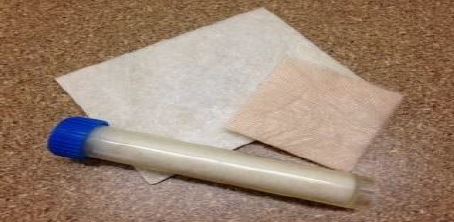Collagen Dressing Clinical Info
NuMed
Collagen Dressings
Biological dressings like collagen are impermeable to bacteria and create the most physiological interface between
the wound surface and the environment. Collagen dressings have other advantages over conventional dressings in
terms of ease of application and being natural, non-immunogenic, non-pyrogenic, hypo-allergenic, and pain-free.
Collagen dressing also provides additional advantage of patients’ compliance and comfort. The environment they
provide enables the body's reparative and immune systems to function most effectively.
Collagen sheets are very useful in first- and second-degree burns, where they are almost routinely used. The cost
of repeated dressings comes down, and the pain associated with such procedures can be avoided. This is especially
useful in children.
The biological advantages of collagen sheet can be summarized thus:
• Collagen sheets are non-inflammatory
• They facilitate migration of fibroblasts and microvascular cells
• They help in the synthesis of neodermal collagen matrices
• They have low antigenicity
• They have minimal biodegradation
• They are non-toxic
• They help in minimizing scarring
The physiological advantages of the collagen sheets are:
• They are impermeable to bacterial migration
• They modulate fluid flux from the wound
• They are elastic, soft, and supple, and therefore fit all contours
• They have good tear strength
• They have enough strength to be peeled off the wound
Dressing materials like calcium alginate, hydrocolloid membranes and fine mesh gauze have a disadvantage in that
they become permeable to bacteria. Biological dressings like collagen, on the other hand, create the most
physiological interface between the wound surface and environment, and are impermeable to bacteria. As
compared to conventional dressings, collagen sheet dressings have the advantage of ease of application and are
natural, non-immunogenic, non-pyrogenic, hypo-allergenic, and pain-free. The use of collagen dressing has been
found to inhibit the action of metalloproteinases. Collagen is a biomaterial that encourages wound healing through
deposition and organization of freshly formed fibers and granulation tissue in the wound bed, thus creating a good
environment for wound healing. Repeated bleeding from the cutaneous lesions by shearing of the gauze dressings
is also effectively countered by collagen sheets. Collagen sheets, when applied to a wound, not only promote
angiogenesis, but also enhance body's repair mechanisms. While acting as a mechanical support, these reduce
edema and loss of fluids from the wound site, along with facilitation of migration of fibroblasts into the wound and
enhancing the metabolic activity of the granulation tissue.



